Last Updated on August 2, 2021
I love The Conjuring films. Ever since I first witnessed James Wan’s 2013 fright-fest, I’ve been hooked. You can credit much of my appreciation for them to Wan himself. However, his brilliant casting of Vera Farmiga and Patrick Wilson to play the big-screen version of Ed and Lorraine Warren was more than just an inspired choice. The two incredible talents continue to bring me back to the films, and their return in The Conjuring: The Devil Made Me Do It excites me. Even without Wan behind the camera this time around, the trailer for the latest installment offers genuinely spooky images that have already been burned into my mind.
Recently, I had the incredible opportunity to head back to Warner Brothers Studio for a very exciting – and Covid safe – mission. And that was to watch the first 11-minutes of the latest adventures of the paranormal investigators. As well, we sat down with the man who took the directorial reins. Michael Chaves (The Curse of La Llorona) to talk about what we just witnessed. Funnily enough, as he and I were walking out of the screening room, I had mentioned that I was a bit nervous initially about Wan not directing. Michael smiled and said he felt the same. It makes me incredibly happy as a fan to say that not only is Mr. Chavez incredibly kind and simply fantastic to talk to, but the opening sequence that I witnessed pretty much shot high above all my meager expectations in the best of ways.
Generally, when we are shown early footage from a film, we write a brief description of every moment on display. I’m not going to do that here. Why? Well because I’d hate to ruin too much for those that are about to see the frights that the Warren’s are facing this time around. Perhaps the best way to describe it is that this opening sequence starts off with such extreme intensity, that I’m beyond thrilled to see what comes next. Instead of them speaking to owners of a possessed doll or visiting a house where a man killed his entire family, we are thrown into the thick of an exorcism.
This entire sequence is absolutely stunning. So much so that I’m afraid to give you too much information about what is happening. It all starts with a young boy being terrorized by a frightening demonic force, one that ultimately takes up residence inside the young innocent. The shocks come fast. This includes David Glatzel (Julian Hilliard) hiding in a shower with this horrific force pursuing him – yep, scary stuff happens big time. And most importantly, we see a hauntingly intense exorcism that is a gloriously terrifying display. You’ll be able to check one image below that is all the more haunting because the only CG involved is adding Hilliard’s face digitally. The movement – which is discussed in this interview – is wildly frightening to see on the big screen.
As well, Michael revealed the end credits which include images of the real people that were involved, and the audio recorded at the real-life exorcism. It will send chills down your spine. Frankly, I was excited to see The Conjuring: The Devil Made Me Do It well before this. Yet after experiencing that opening sequence, this movie can’t come soon enough! Thankfully, we only have to wait until the film’s theatrical/HBO MAX release on June 4th. I for one, cannot wait to get those creepy feels again. Damn, that was an intense bit of cinema!
Until then, check out this in-depth, and extremely fun, interview with Michael Chaves where we talk Conjuring, James Wan, X-Files, Freddy Krueger, and much more. While there might be minor spoilers here and there if you’ve no idea what this story is about, he did a nice job of only giving us a brief glimpse to whet our appetite. And I’m certain there are far more surprises waiting for us when we finally witness the upcoming film. I’m down for it all. Now here is Michael jumping in right after the footage was revealed…
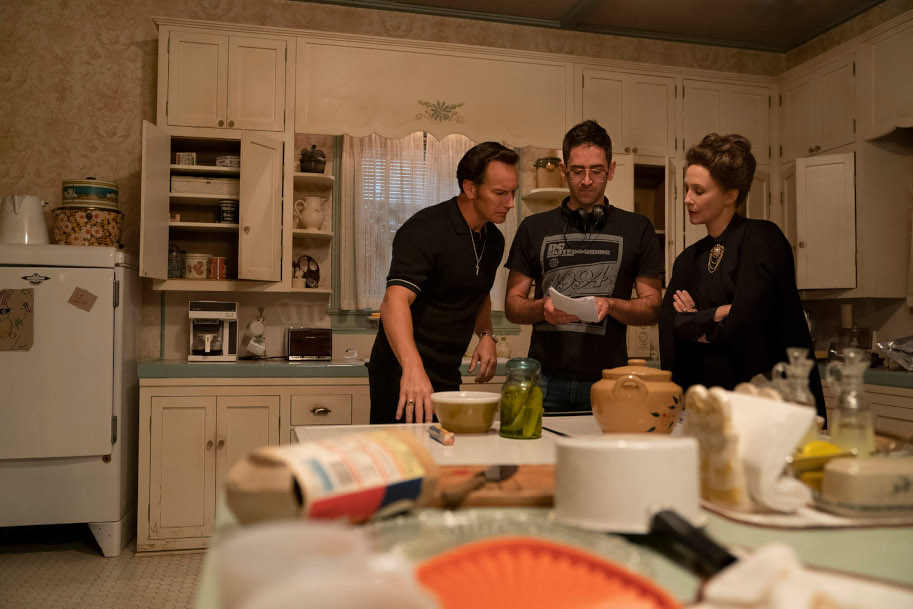
Michael Chaves: The idea from the beginning is like, we've seen the Warrens do a bunch of exorcisms. And the expectation is that all of these movies are going to end with them facing a demon and exorcising it out of someone. So what if we start with that and what if it doesn't work? What if it goes horribly wrong? So not only is it flipping the whole kind of expectation of a Conjuring movie on its head but also taking the Warrens – who are always the good guys, they're always right and they always win – and starting off with a failure starting it off with where things go wrong. Well, um, so yeah, boom.
Yeah. I mean that, I know a little bit about this case and it’s truly fascinating. What was the inspiration to go with this Arne Cheyenne Johnson’s case?
You know this is something that was decided long before. This was always one of James Wan’s favorite cases. It was something that he always wanted to tackle and he felt like the third Conjuring is the one to take it on. It's definitely not the one that you could start with because it is such an extraordinary case, such a sprawling case. And, it’s also, you know, you can go on Wikipedia and find out the outcome of it is, to see how it ends the way it does. Before I forget, I did want to show you, we have an audio recording and we don't need to do it right now, we can do it like in a little bit later, just don't let me forget, because being a ghost hunter fan, I think, you are going to dig that.
Oh absolutely. Sweet! I’m looking forward to that. One thing I’m curious about, and what is interesting to me is that there has been a little controversy behind the Warrens and how truthful they were. Is it difficult to kind of create the fictionalized Warren family? I mean, I met Lorraine, I loved her. I thought she was delightful. And that was why perhaps I'm still fascinated. I don't believe that they're “frauds” as some do claim. I believe they were trying to do some good things. Is it difficult to maneuver through that when you’re making this film or does that even come up?
Yeah. You know, I think ultimately it wasn’t hard because people love Patrick and Vera and they love the Warrens that they have created. So they could be doing terrible things and you would actually just still love them. Cause we have such an emotional connection to them. I think that the case story of Arne Johnson, you know, this is a story of a man who murdered his landlord and he claimed demonic possession…
This first one, correct?
In the U.S. There’s someone in England. But yeah, he's the first one in the U.S. and so it was definitely this kind of huge legal precedent, it was the first time it was done. Well, I don't know if that's a precedent now.
Yeah, well. [Laughing]
At the time it was. I think that that was something that when I got the script and I started reading the case, I was like, ecstatic. I was like, oh my God, it's the third Conjuring, this is amazing. But then when you're kind of reading the case, it's like how do I feel about this? It's easy to say, oh, I believe in ghosts or I believe in demons when there isn't a victim. I mean, this went to trial, there is a real victim and they need to find the truth to it. I grew up Catholic. So like, I'm so sucked in and down with all this stuff.
But like all of a sudden, you know, I start thinking like, wait, do I believe in this? Was he possessed? That definitely kept me up at night cause I'm like, I hope I get this right. This is a man's life. And this is, you know, what if I was the victim? What if my family member was the victim? And ultimately my own beliefs I had to put in the backseat. This is the story of the Warrens and this is their belief. These are always stories of faith and usually, it's like faith in God. And in this one, it's the faith that we put in other people, the faith that the Warrens put in Arne. They believed in him. This was in 1981, and the Warren’s are well-established, but they're famous and infamous and they went to court and they stood behind him. I mean, I think that that was the kind of the judgment I got out of it, you know?
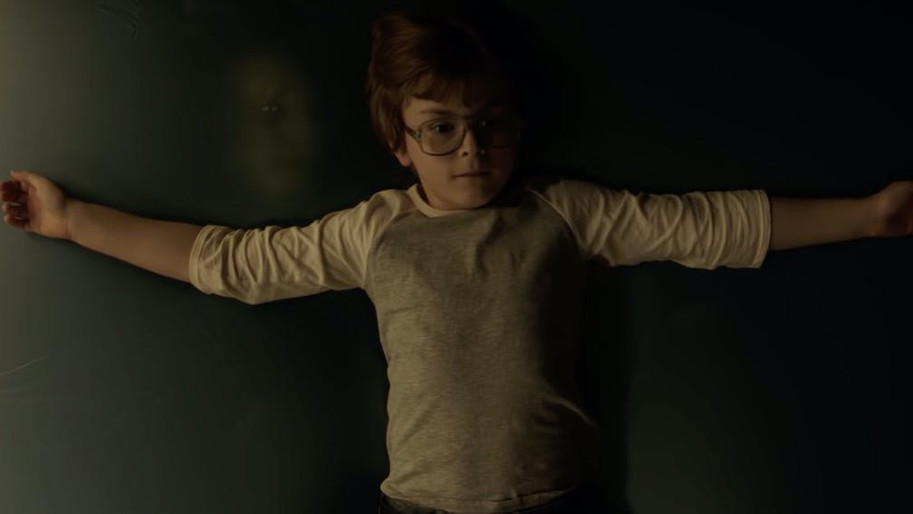 Was there a kind of fear in going a little farther? Going in a little deeper into the psyche of these two when actual lives are at stake?
Was there a kind of fear in going a little farther? Going in a little deeper into the psyche of these two when actual lives are at stake?
Yeah. I mean, I think that. I have a big concern about getting it right. And then also telling Arne's story and telling his experience with this possession. What was his point of view? I think that these movies are always marketed as like, this is the darkest one. This is the scariest one. This really is the darkest one, you know, and it's really because of the subject matter. The exorcism that it starts out with, it's basically when Arne believes the demon transferred into him. This is a real exorcism, this was an approved Catholic exorcism, two priests were there. We made it into just one priest with Father Gordon because we had to get Father Gordon. And so the movie.
There you go.
But it was a real thing that happened and the Warrens were there, Arne Johnson was there. I guess that's a good segue to the, you know, we have the audio clip of the actual exorcism and we play it over the end credits if you want to see it.
I would love to see that.
So of course you didn't come to see the end credits, but we put it over to the end credits. So you'll see the end credits, but it's also cool. Cause you get to see the real Arie Johnson, the real Debbie Glatzel, and you also get to see like the Warrens’ with Debbie outside the courthouse.
One of the things I've always appreciated is how the scares are handled, which from what I've seen, holy hell, that was crazy good! Can you talk about creating the possession scene? A lot of that looks like you are kind of sticking with what James started and keeping it practical.
Oh yeah. Let's actually pull that (movie images on the screen) up. Honestly, I think that's the great tradition of the Conjuring movies is its reliance on practical effects. Of course in all of them, there is some CG enhancement. But from the top down, like all the way, you know, to the studio, to New Line, like they're filled with horror fans and they love practical effects. So it's actually very easy to kind of get the license to do it. This was in camera. There’s no speeding up or anything. That is a little girl named Emerald Gordon Wulf. Oh my God, she's doing that with her body. All of these contortions are all real. And in camera, what we did was put Julian's face on her. But it's her body doing that stuff.
There's no CG there. I think that the CG is when you see the face. Yeah. But that's literally her head and she was like screaming. She twisted her body into that position. And it's screaming at our actress. And what's great is like, when you have that to react to as, as an actor, you really can get freaked out. Literally, you didn't even speed it up. And it was funny because that wasn't even the plan originally, you know, [when she gets up and contorts].
She [originally] did that same thing, but she did it really slow. She was like, look, and it was like, Ooh, that's great. That feels like the Exorcist. And we shot that. And I was like, Emerald, can you do anything else? Can you do like a different version of that? And she was like, I could do it really fast. I'm like, yeah, show me what that is. And everyone's just sitting around and watching and she's like, she did that. And everyone was like, OH, like, you could feel like the sound of the entire crew. And I was like, oh, I think we're going to do the fast one. I think the fast one is just so unnerving.
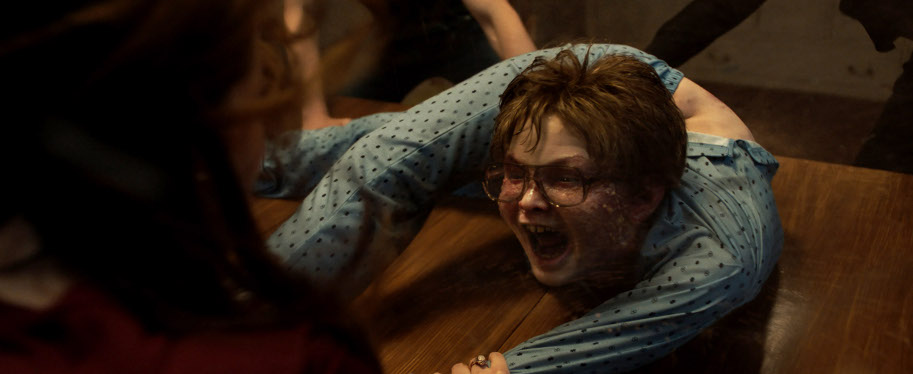 Well, yeah, we've seen the Seventies version. Let’s rev it up [Laughing].
Well, yeah, we've seen the Seventies version. Let’s rev it up [Laughing].
Right? I think that's also what works. So, so great. It's like, everyone kind of sees it cause you almost expect it to milk those moments, but when it happens so quickly and it's so unnatural, I think that that's kind of like what always sets people back. I'm really proud of that. About her doing that all on camera. There’s also a shot in the trailer, which I think people assume it's CG. Lorraine is in the woods and it's daylight and then she steps down and then all of the shadows fly around. That's all in-camera. There's not a single effect, it was not even touched like here. We had to like put his face on it. That scene was an untouched shot. And what we did is we just, we lit it and kind of created our sun. We put it on like a technocrane and we had all this dolly track and we literally just kind of pull this giant light through the woods. That's how you get those dramatic transitions. And so we were shooting it cause we were looking down, we shoot it entirely at night. So we light it like it's day. And then the camera comes down as it travels across the track. And then it looks like the sun setting. That was not even touched by the computer. That was all like, well, it must have the camera's computer, but basically like no visual effects in that, which is one of those things that I'm just really proud of it. And we just tried to do that wherever we could in the movie. I think even in something like that, which isn't a horror moment, I was like, I still want it to feel real, also when you see it on a big screen… Cause like when you're seeing that stuff on your computer, it's easy to just be like, ah, CG. But when you see it on the big screen, it's like, Oh yeah, you can feel the sun moving. It also sounds so cool. And ATMOS, cause it feels like the whole theater is moving.
What brought you to Julian Hilliard and Ruairi O’Connor? What were you looking for to cast those two, because they're so important in the story?
Oh, we saw a lot of actors for both of those roles and you know, Julian was just, Julian's the best. He's just like a magnetic kid. He's like a little adult. He comes on to set so prepared. He just knows it. It's also, he's in all of these kinds of genre shows and he just owns it. I think that there's something there, you know, and this was before he was in WandaVision. And it’s just like, I love to see him in all of these things. We really lucked out. I mean, he kinda got that and he just gets it. I think that sometimes with kids, they’re emotionally not ready to do anything that intense.
Did I tell you with the exorcism, we actually played that before we did it? In the room, we had all the actors there and we actually played the recording of it. And it was creepy. Like everybody asks, ‘Oh, did anything happen? Like did anything weird happen on set, like creaky doors or anything?’ And the creepiest thing was just that day when we did it, where we just had everyone there and we had Julian there who plays David Glatzel, who is on the recording. And Ruairi who plays Arne Johnson. And everyone's excited to be making the movie. Everyone's excited to be there. And then you kind of stand around and it's like this moment of silence, you kind of play that over the speakers. And it’s like, just like the temperature in the room drops. Like everybody just feels the moment, and it's funny cause we put Joe Bishara music underneath it, which I think is kind of like, it fills out the experience. But when you hear that raw audio and then you're looking around at the actors and, oh yeah, you're playing David Glatzel. That's like screaming his guts out. And you're hearing this, you're looking around at the people who play these roles. I think it brings gravity to it. I think that was one of the creepiest moments on the set.
Well, that's the thing, I think why these movies work. Why the first two work, and why I'm excited about this one. Literally, I'm like, can we watch the rest right now [Laughing]? It's character-driven yeah. And I think a lot of times horror movies tend to go in the opposite. Are they okay? Yeah. We just want to see the bodies pile up, but for The Conjuring, when you're not killing a bunch of people you have to rely on character. How often did you work with James and the screenwriter to find the right tone? Or was the script set before you even took it on?
You know, that the script was pretty much there. James Wan, this is his franchise, this is his baby. And honestly, it's been one of the greatest kinds of joys and thrills to work with him. I'm a huge James Wan fan. And to start working with them online, you run and develop that kind of working relationship. And now I would consider a friendship and the process of making this. I think part of the reason that the franchise succeeds and it has that heart is, it's made by people that have such big hearts. I mean, James is like such a wonderful, great guy. And he's cast two amazing people at the core of it with Patrick and Vera.
The two of them are such great, great people in their bones. And I think that that's why people come back to it, you know? And I think you're like, I mean, I'm a sucker for all horror movies. Even the ones where the bodies do pile up. I think that what's kind of fun about this, and what’s wonderful about this is that it takes it – you know, life is sacred and precious – and that idea of like, we're not going to just ruthlessly kill people, we're going to make you care to the point where you actually really do worry about if people are going to like make it through this. We definitely put the Warrens through, through the wringer, as you can see from that opening. This is a franchise where I think people love the Warrens. And, you know, that's just to say, get ready, get ready for it.
What is that like on set and building the story with those two?
It's great. I mean, I'm of course a fan of the franchise and I was both thrilled, but also scared to kind of step into this world, these shoes, and work with these guys. They were so awesome and so welcoming. It’s funny cause they've got incredible chemistry on screen. They have this incredible friendship on set. And I think it's not just these movies that they've been in. They were in The Commuter which I was just watching. I mean, their families hang out together. And so, you know, when they're together when they're on set, it feels like summer camp, it feels like they just love being with each other, and it kind of creates this kind of vibe and positivity with everybody involved.
It's funny because they work so differently. Vera is someone who comes to set and she almost doesn't want to rehearse. She's like raring to go, and she will of course rehearse, but she’s ready. She has her process and she's like chomping at the bit, which I love, I love that kind of energy. Because I also just like want to shoot. I kind of want to get into it. And Patrick loves to like to talk it out. He loves to kind of figure out the scene. And at first, the first couple of days when he was doing that, I was super intimidated. I was like, what? What's going on? Why is Patrick talking so much, why’s he asking so many questions. It's like, do I have something wrong? But he loves to just kick the tires on the scene. He'd be like, okay, I'm going to be here. Vera's going to be here. We got the kids that are going to be there, I'm going to be walking in. Okay. So what if I sit here? Am I sitting here? And so I'm like, yeah, I go through the process. At first, it was like, it was, as I said, it was terrifying. It's almost like he's kind of walking around the car, kicking the tires. He's like, okay, this is good. This is it.
It's so funny because Vera is like, standby, like totally ready. She's ready to shoot. He's kind of working everything out. And it's kind of interesting. She's very instinctive, almost like Lorraine Warren. She kinda has her kind of, you know, clairvoyant kind of instinctive process. And then, Patrick's actually very much just like Ed Warren, who's very verbal and analytical, it's kind of cool to see that. And they even kind of mirrored the other couple in it, which is Arne and Debbie, you know, Ruairi and Sarah Catherine Hook. And you know, Ruairi really did a deep dive in this. It’s a really hard role. I mean, he plays Arne Johnson and he definitely had that kind of, that Vera energy. He would come to set, listening to his music. He was kind of in his headspace and really committed to the role. And Sarah Catherine was totally just like Patrick, she would come on set, she'd be like, okay, like she would just love to talk things out and she’d be very verbal. And it was just so funny to see them kind of mirror each other in these. And as they do in this story, you know, these two couples kind of mirror each other.
I love that. How difficult was it to find the balance between creating a “horror movie” yet creating these characters and making it realistic and making it feel genuine, and how closely did you follow the actual case?
You know, we took some liberties. I think that the exorcism was very real and the events that followed were really real. There were certain things that you just kind of have to condense because there's not quite enough time. You know, the story itself is really insane. I mean, it’s insane just how these things that did happen and some of the stranger things that weren't able to make their way into the story. Cause it just like, there were a couple for like legal reasons and then a couple just because of time reasons. It is a mix of the two.
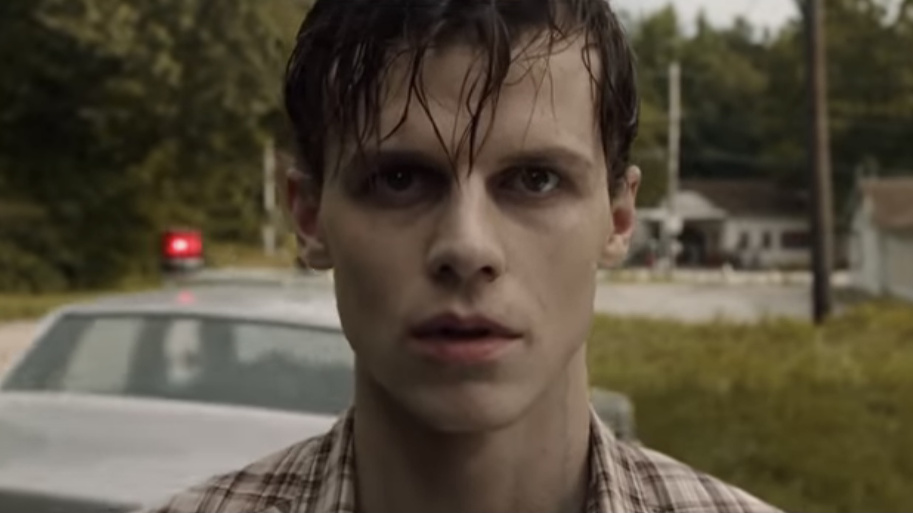
I was talking to a friend about you, and about The Curse of La Llorona and what an interesting-looking film it is, and how you create this urban legend on film that many believe in. What's the trick of that? What's the trick of telling this story because you've done it, you've taken on a creepy story that a lot of people believe in. And a lot of people believe that there is demonic possession. Is that a difficult task?
Yeah. I mean, I think it’s if we didn't have that faith, if we didn't have that belief in these things, I don't know if people would be going to the theater. I grew up being a big X-Files fan and it's funny because I see echoes from the very first Conjuring. I was like, oh my God, they're kind of like a folksy, married, Mulder and Scully. There's that kind of line in The X-Files of like, I want to believe. Even on that show, there was like a kind of journey of faith. It was a story of faith and, you know, it's like, you know, Scully was Catholic, and Mulder was a true believer in extraterrestrials and they kind of balanced each other out. I grew up Catholic and I also want to believe. I'm also a believer in science, a man of science, if I can even say that it, I get one vaccine shot and I'm a man of science [Laughing]. But you know, I think that we all believe in the things that are around us, but I think there's just this kind of deep human desire for something else. It’s for the infinite. Or it’s a belief in God. It’s, I think, one of the things that are kind of exciting about the belief, in ghosts and extending to demons and even the devil. It also kind of permits a belief in God and in the infinite and the idea that we can exist beyond this. I think that those kinds of beliefs are kind of what we have a deep hunger for that. And you know, I think that we'll always like stories about that.
Well, I remember the first junket I did the original film and Ron Livingston had a really interesting answer. I asked him if he believes in the paranormal, like do you believe in possession? His answer was something like, I'm a skeptic, but to be a real skeptic, you have to be skeptical of your own skepticism.
Oh, that's great. Oh my God, I'm going to steal that.
Right?! Such a great answer. Speaking of the first film, and of course James Wan. How much were you inspired by James? This looks different. This looks unique, but it still has that vibe.
Yeah, you know, 100% I wanted to… I’m a Conjuring fan and I wanted to… someone was asking the other day, ‘Oh, so you want to put your stamp on it?’ And I'm like, actually, no, to make the next Conjuring movie, I want to deliver on the promise of that to fans. I don't want someone to look at it and be like, wait, it's so different because already the story's different there. We're sending them out into the world, we're doing all these kinds of different things within the story. So I'm like, actually, no, I want to try and like, naturally it's impossible for, just by the choices that you make, to keep your instincts and your things off of a project. But I really wanted to just make something that was as much as possible invisible. And what people are experiencing is like, this is the next chapter of The Conjuring. I mean, back to like X-Files and crazy reference, but it is like, you're never looking at it like, ‘Oh, this is different. What's going on with this?’ You're just like, the difference was the case. You know, the difference was like, Oh, this is a monster case. This is a conspiracy case. You were kind of being pulled into the story and that's what made the experience unique. And I mean, I think that was always what I was excited about when I first saw the first Conjuring and I was like, that's a big artifact room, I can't wait to see every story that unfolds from that. And honestly, my mind is still even sitting here saying that, remembering that moment, my mind is blown that it's like, I've, I've put an artifact in that artifact room that there is a story that has been told that kind of goes in there. I hope that answers your question. Like I just started geeking out about like, I can't believe I'm doing a Conjuring movie!
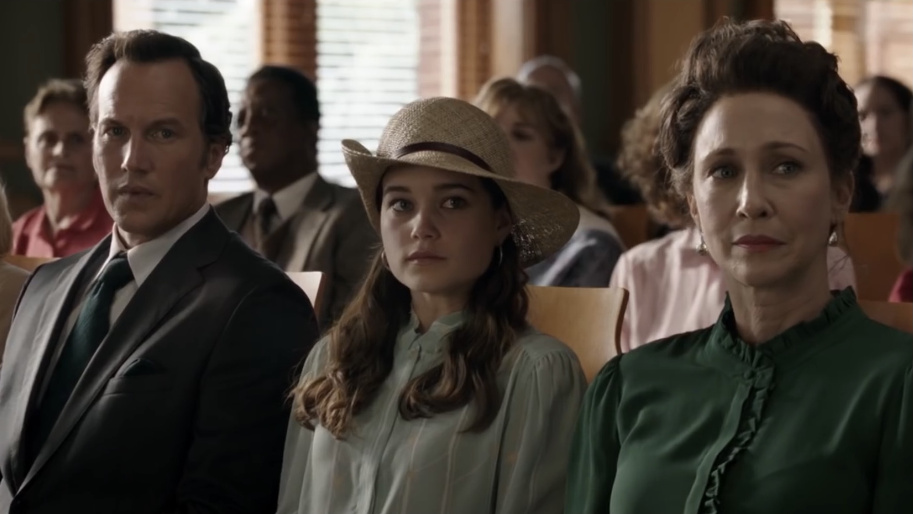
I love the passion that you have. Have you ever had a personal experience growing up Catholic? Did you ever see, hear noises, hear voices, anything that stuck with you as a kid or as an adult?
Yeah, the only thing is, I do believe I saw a UFO. It was on the 4th of July and I was in my backyard and there are no fireworks or anything, but there was some object in the sky that was zigzagging. I don't know how old I was. I think I might've been like 10 or something. So it's like, you know, old enough to know what an airplane was and moved like. And you know, the movement was so staccato, it was so sharp. It was like nothing really moves at that speed. I always remember that. Of course, I wish I had a really good ghost story.
Do you have your thoughts about any of their cases that you'd like to take on again for a sequel?
Yeah. You know, there are some cases that I think are pretty fascinating that I think, uh, yes. The short answer, because I can't really give the long answer is, yeah, there are some really cool cases that they have. And I think that there's definitely stuff in mind.
As a filmmaker. Were you always attracted to the paranormal? I mean, was that always kind of, obviously, you grew up a horror fan watching The X-Files, was that always something you wanted to get into? Had you ever thought, I want to do romantic comedies or was it always kind of, yeah, this is, this is my genre?
I always loved scary movies. And I think it started with watching scary movies on VHS, like getting them from Blockbuster. And there was something about, you could see them on HBO, but it was really exciting to go to Blockbuster. You would see the covers and there was something about that tactile experience. And talking about the artifact room, and it was like, that was an artifact room of sorts. You would go and you would like to experience it, you know. Now it's like, I feel bad for the kid's cause, how is it an experience? You're just streaming, you don't touch anything. There was something about getting driven to Blockbuster and actually picking up a tape, like leaving, you know, leaving with your mom, with your mom saying, should you really be seeing that? And then convincing them to let you see it. It always kind of felt exciting and dangerous. And then it was like, this kind of thing that you had to return, you know, there was this element of ceremony to it. It felt like if you saw the trailer, we have these, like these, these evil witch totems, it felt like a totem. It felt like, I'm getting this thing for a short amount of time and it is filled with this dark, evil power, and I'm going to experience it and then I'm going to return it. And of course, I watched all the movies, but there's something about a scary movie that I felt like it was dangerous. And I loved that feeling as a kid. And you don't really get it. It's hard to get that feeling back, you know, of like watching something dangerous.
What were some of the movies that stood out for you and maybe inspired your vision as a filmmaker?
Well, if you've seen the trailer for Conjuring 3, there’s A Nightmare on Elm Street. It's crazy. I was like trying to recollect, cause actually, I think the fourth one was the first one that I saw and it was either the third one or the fourth one, but it becomes a little fuzzy and the fourth one is the, you know, I believe it's the Dream Masters. Yes. And that is with the water bed scene, which, the irony of it is my AD on this, worked on that one. And I was like, you gotta tell me everything about it. You got to tell me how they did it. And we have kind of a different approach to how we did ours. But you know, those movies had a big impact on me.
It's funny cause I'm really curious, excited to see if New Line ever reboots that. And what would be the approach with that? And cause, you know, I do think that those movies were so special. It’s so funny because I see the inspiration of that in so much stuff. It is something I love because it's a horror movie. I love that. Cause it's a movie and it's fricking awesome. I think that you go back to that first one. I mean, they're all different levels of interesting, you know, and some of them maybe don't quite hold up like as you remember, or as I remember them on a rewatch. But you go back to even the first one and the rotating room, and the blood coming up. There are things in there which are/were so visionary and you can even see it in stuff like the rotating room in Inception. You can see these ideas that have ripple effects through cinema.
I think that that is one of the most awesome series that has been. And also like what was kind of great about Freddy is, I mean he evolved as it went on, and he kind of became a different character. There was something that was really different. I even remember the Will Smith song he did about Fred Krueger and that was like, I remember, cause that was like my first Will Smith memory. It's him singing about that. And then I think he was in Fresh Prince. But it's like, that stuff was, I don't know, it was kind of such a cultural icon, for me, nothing matches Freddy. And The Exorcist. And The Shining. [Laughing]
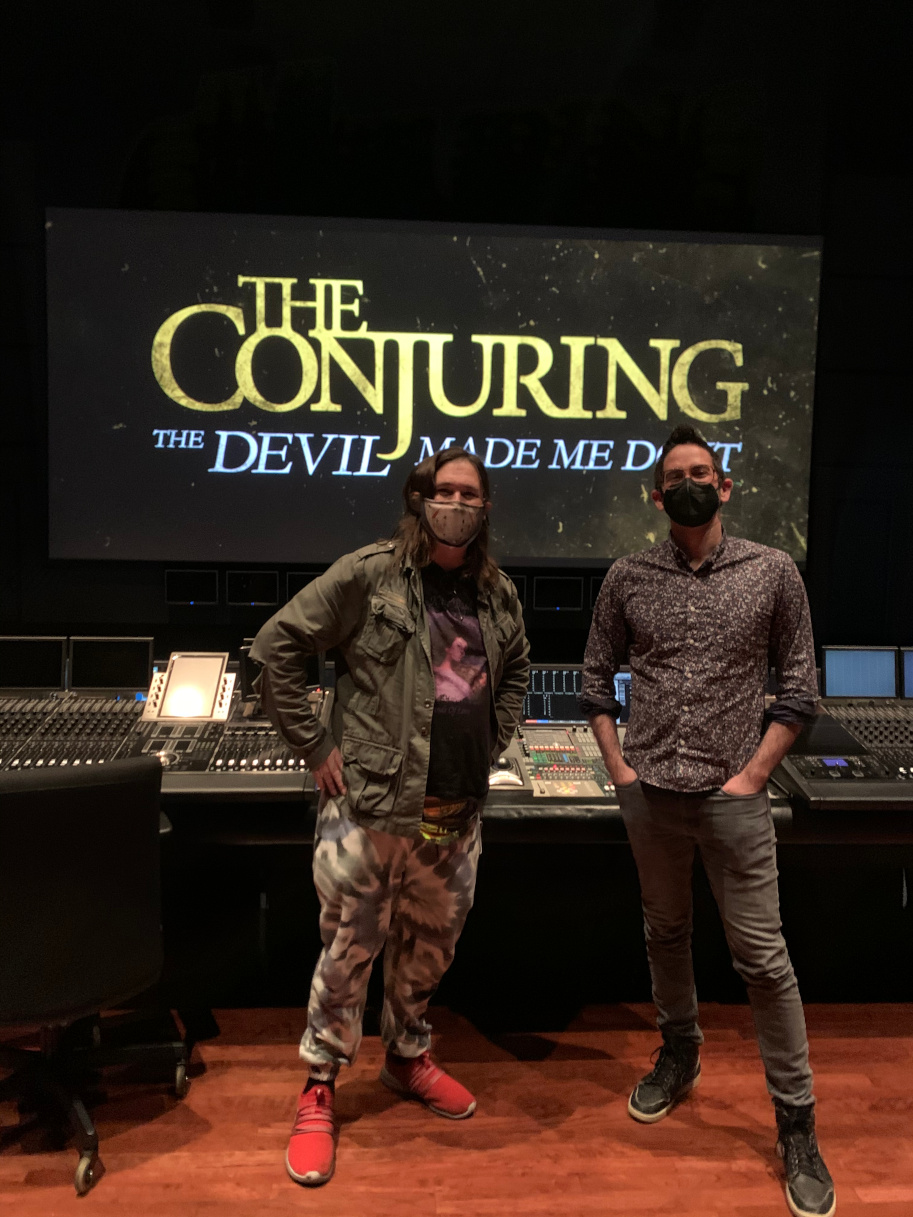
I always think of Wes Craven's New Nightmare. So, so far ahead of its time. What a terrific film. And I think, I feel like a lot of people lump it in as just another sequel. Yeah. But my God, what a gorgeous film. Well now let's get back a little bit because I keep looking at what is on the screen in front of us and just being in awe of what I just saw, I saw 11 minutes of an incredible possession scene that just made my skin crawl. How dark do we get?
Um, well, uh, you got to see the movie [Laughing]. Well, definitely there's the murder. That was one of the biggest challenges, how do we handle this? It's like, do we even show it, do we put it through Arne's point of view? I think it's a sequence that is unexpected. I think that that is probably the best way to describe it. Because we were kind of just like wrestling in that kind of evolve as we're kind of going through it. Cause I debated it, like, do we even show it? Is that right to show this and we don't quite really show it, but it is the kind of the moments leading into it and the moments leading up to it.
It's very different. It’s very different from any other Conjuring films and just kind of how we handle that. I think it's dark. I think it's, I think that one of the things that's exciting about it is we get to put them against an adversary that they've never seen before, and you kind of probably had some glimpses of what are they up against? I think the natural assumption is they're going to be going up against a demon or they're going to be going up, you know, like, what is that, you know, what is that creature going to be? And I think that this is a movie filled with surprises and things that they haven't faced before. And I think that, with that kind of discovery, I'm really excited for them.
I've always felt there’s a fine line between mental illness and possession. Especially in recent years, the past year dealing with the pandemic has certainly put a spotlight on it. Did you kind of go into the history of this when you started working on the film?
Yeah. You know, honestly, I think a lot of times stories and films about possession are stories about mental illness. I think it's a way that, unfortunately, mental illness is so stigmatized, you know, that it's hard to talk about that stuff. And if you're going to make a movie about mental illness, it's an indie movie that no one's going to see because no one wants to deal with that stuff. You know, and definitely, in this past year, I think so many people have struggled with mental illness and it is, I think it's hard for a lot of people to openly discuss that. And it makes them very vulnerable. I think that's what's kind of great about these films. What’s great about stuff like this is you can externalize and you can deal with it. You can see people suffering through their personal demons, whatever names we give it, and getting resolution. Ultimately these are stories that have a resolution, you know, that usually comes from the people who are closest to us. And I think that that is like a message that is totally valid and really important
What do you hope people will get out of The Conjuring: The Devil Made Me Do It?
I think they're going to get a thrill ride. I think that this is going to be for fans of the franchise, they're going to be able to see the Warrens in ways that we've never seen them before and push the limits. Anyone who's seen the movie says this is the most Warren-centric story that has ever been told. And, where I always thought, well, they're all Warren-centric, they're Warren-centric they are the heroes. But I think that this is a big thrill ride. It's a great payoff for fans who have followed the Warren's up to this point. And I think it's also just, we've been living a year of a horror movie. It's great to actually see something that has a resolution and I'm excited for people to enjoy that.
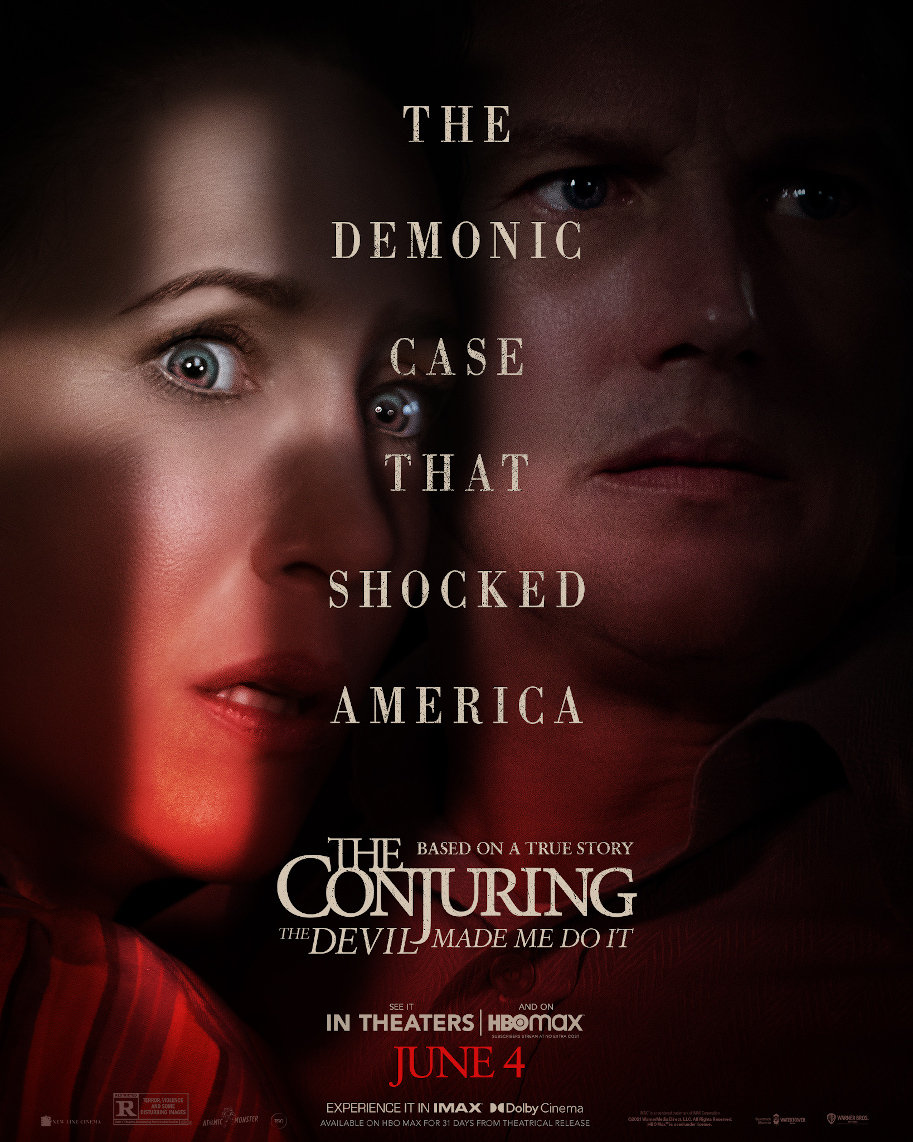






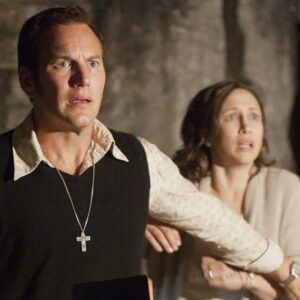
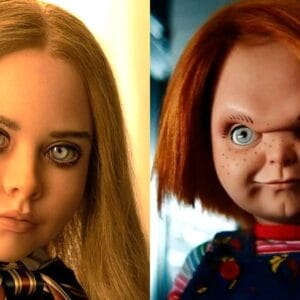



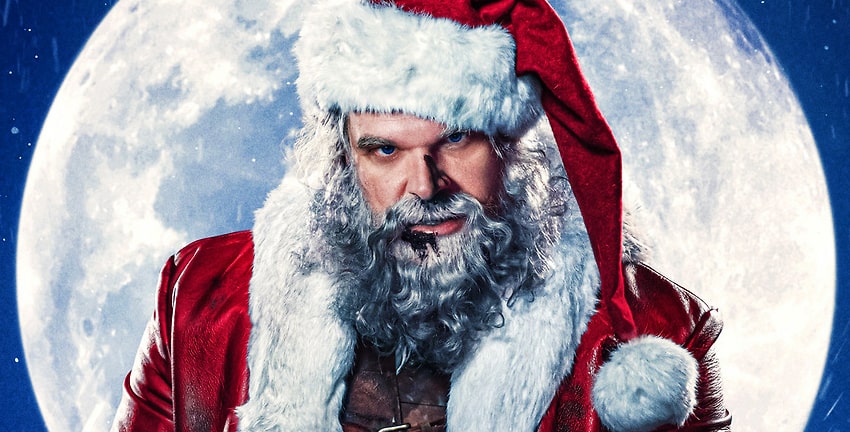

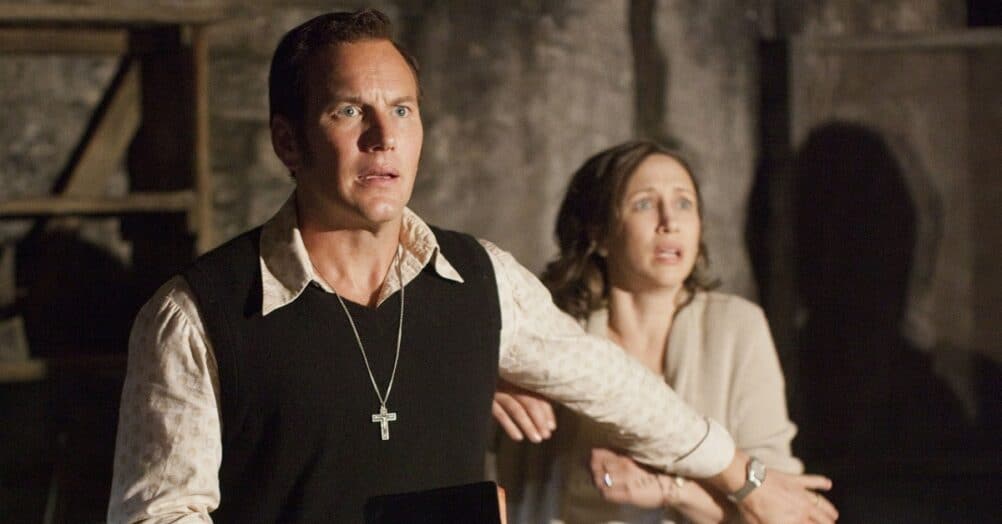





Follow the JOBLO MOVIE NETWORK
Follow us on YOUTUBE
Follow ARROW IN THE HEAD
Follow AITH on YOUTUBE